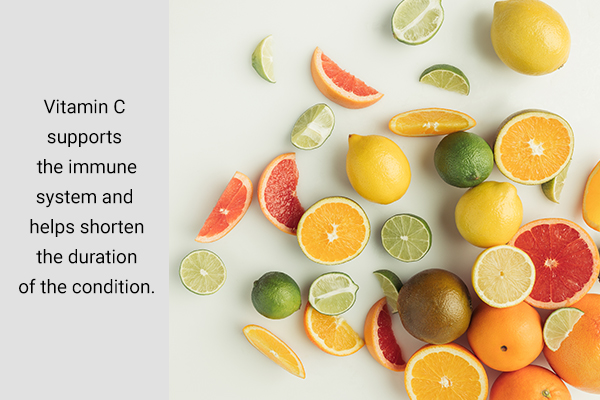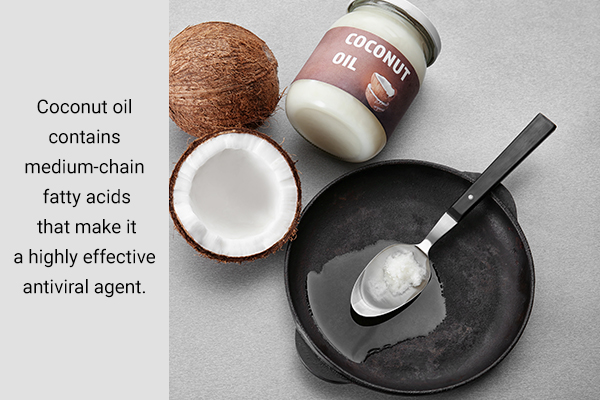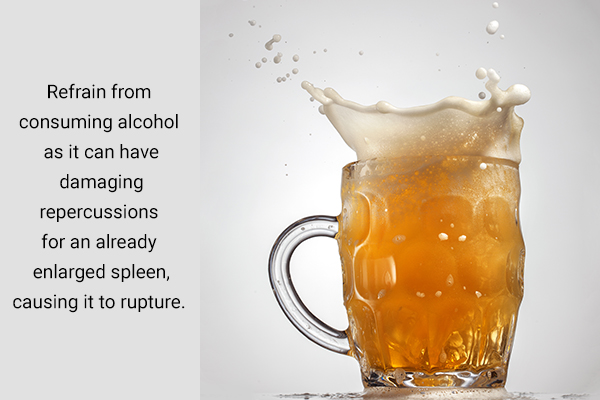In this article:
Mononucleosis, commonly known as the kissing disease, mono, or glandular fever, is a relatively harmless and common infectious disease. Although typically prevalent among adolescents and young adults in their early 20s, mono can be contracted at any age.

In the case of young children, the symptoms of mono are often absent or very mild that the disease goes undetected and undiagnosed. However, the children who do get exposed to this infection develop antibodies for it and remain immune to it for the rest of their lives. Given this previous exposure, older adults tend to be safe from this disease.
What Causes Mononucleosis?
- Mononucleosis is an infectious condition caused by the Epstein-Barr virus. This virus belongs to the herpes family and targets lymphocytes and epithelial cells. (1)
- Mononucleosis got its name “the kissing disease” due to the fact that the disease-causing virus is generally present in the saliva and mostly spreads by kissing.
- The disease can also be transmitted through other bodily fluids such as blood, semen, and mucus. The incubation period for the virus is approximately 2–6 weeks before the onset of illness. (1)
- Thus, sneezing and coughing, blood transfusions, organ transplants, and sharing food utensils or straws with an infected person can all put you at an increased risk for contracting this virus. The virus, however, is not spread by any sort of casual contact.
- People who are regularly at close quarters with large crowds of people, such as high school and college students as well as medical professionals and personnel who get exposed to the virus carrying bodily fluids on a daily basis, run a higher risk of contracting this disease.
- Furthermore, people on drugs that compromise their body’s immunity are also increasingly susceptible to the infection.
Signs and Symptoms of Mononucleosis

Common signs and symptoms of mononucleosis are: (2)
- Fatigue
- A sore throat
- A headache
- Fever
- Swollen lymph nodes in your neck and armpits
- Skin rash
- Swollen tonsils
The disease can also lead to the following complications:
- Enlargement of the spleen and consequent soreness in the upper abdomen
- Liver issues such as hepatitis and jaundice
- Anemia
- Swollen tonsils that can make breathing difficult
Simple Ways to Treat Mononucleosis at Home
Here are some home remedies for mononucleosis.
1. Trust the healing potential of astragalus
Astragalus is a traditional Chinese herbal medicine that helps boost immunity. The immune-building and adaptogen properties of astragalus help fight the infection quickly and provide relief from the discomforts associated with it. It also works to re-energize the body.
A 2014 study published in Acta Virologica indicated that astragalus polysaccharide (APS) is potentially useful as an anti-Epstein-Barr virus drug. (3)
How to use:
- Add a handful of dried astragalus root slices to 1 quart of water. Boil it, let it simmer for 30 minutes, and then strain it. Drink this tea twice daily.
- Astragalus is also available as a supplement, which you can take after consulting your doctor.
Note: The most commonly reported side effects of astragalus are diarrhea and other mild gastrointestinal effects. It may affect blood sugar levels and blood pressure and may be risky for people with certain health problems, such as blood disorders, immune disorders, diabetes, or hypertension. It is therefore imperative that you consult your doctor before taking this herb. (4)
2. Eat vitamin C-rich foods

A water-soluble vitamin, vitamin C is an important component of a mono treatment regimen. It supports the immune system and helps shorten the duration of the condition.
A 2014 study published in the Medical Science Monitor reports that high-dose intravenous vitamin C therapy has a mitigating effect on the duration of Epstein-Barr viral infections, including mononucleosis. The study also demonstrated that higher levels of vitamin C induced lower levels of antigens in patients suffering from acute Epstein-Barr infection. (5)
If an intravenous infusion seems inconvenient, you can effectively boost your vitamin C level by consuming a nutritious diet replete with this magic element.
How to consume:
- Eat foods rich in vitamin C, such as bell peppers, kale, broccoli, strawberries, lemons, grapefruits, kiwis, pineapples, blackberries, tomatoes, spinach, Swiss chard, and oranges.
- You can also take a vitamin C supplement, after consulting your doctor regarding the best dosage for you.
3. Gargle with salt water
A sore throat is one of the most common symptoms of mono, and salt water gargle is the best remedy for it. (6) Warm salt water has a soothing effect on the throat and reduces the discomfort to a great extent.
How to use:
- Add ½ teaspoon of salt to 1 cup of lukewarm water.
- Stir it well to dissolve the salt.
- Gargle with this solution for a few seconds, and then spit it out.
- Do this at regular intervals to relieve a sore throat.
4. Use coconut oil for cooking

Coconut oil contains medium-chain fatty acids that make it a highly effective antiviral agent. It is effective against mono and influenza and is also beneficial for those who have measles, herpes, hepatitis C, and AIDS. (7)
The lauric acid and the other medium-chain fatty acids in coconut oil are rapidly absorbed by the body and are used to form monolaurin, a monoester that has powerful antiviral and antibacterial activity.
Plus, the wide array of vitamins and nutrients in this oil help restore immune function and improve overall health. (8)
How to use:
- To prevent infections, you can use this oil in your daily cooking.
- To treat the infection, take a daily dose of extra-virgin coconut oil by mouth. Depending on your tolerance level, you can take 1 to 3 tablespoons daily until the infection subsides.
5. Increase your fluid intake
Drinking plenty of water and other healthy fluids is very important, especially when you have a fever. Fluids help bring down a fever, ease a sore throat, and prevent dehydration. (9)
Plus, adequate hydration is good for your immune system. Water helps flush toxins out of the body and ensures that your cells and organs function properly.
- Drink plenty of water at regular intervals. To relieve a sore throat, you can sip warm water.
- Homemade vegetable juice, broth, and fruits rich in water content help keep your body hydrated and also work as energy boosters.
Note: Be sure to avoid alcoholic and caffeinated beverages, which can contribute to dehydration due to their diuretic properties.
6. Get sufficient rest

One of the best ways to treat mononucleosis is to get plenty of rest. This disease can completely wipe you out and keep you feeling drained and fatigued throughout the day, even after a good night’s sleep.
Do not push your body through viral fatigue in order to work, as it can make you weaker and can delay recovery. Get plenty of rest and sleep until the fatigue subsides and your energy levels are restored. (10)
Whenever you feel tired, listen to your body and give it a chance to heal. It is best to avoid sports, exercise, and other physical activities for a month after the infection starts.
Also, because there is always a looming threat of an enlarged spleen associated with mono, it is best to steer clear of any type of strenuous activity such as contact sports. Exerting yourself too much can lead to the spleen being ruptured.
7. Try a cup of echinacea tea
The herb echinacea can also help treat symptoms of mononucleosis and promote recovery. It also has been traditionally used in the treatment of other infections such as cold and flu due to its potent antiviral and immunity-boosting attributes.
The reputed immune-enhancing effects of echinacea are thought to be mainly directed towards nonspecific immune mechanisms, including phagocytic activity, macrophage activation, and NK cell activity. (11)
Apart from strengthening the body’s defenses, it also helps keep them properly coordinated by lowering the systemic inflammation in the body which is due to viral infections such as mononucleosis. (11)
How to use:
- Steep 1 or 2 teaspoons of dried echinacea in 1 cup of hot water for 10 minutes. Drink 1 to 2 cups of this tea daily.
- Alternatively, mix 1 teaspoon of echinacea tincture in 1 glass of water. Drink this solution 3 or 4 times a day.
- You can opt to take echinacea capsules until symptoms disappear, but consult your doctor first.
Note: Those suffering from autoimmune disorders must not take this herb. Plus, this herb is not suitable for children.
Additional Tips to Deal With Mononucleosis

- Do not indulge in heavy lifting and other rigorous activities for several weeks to reduce the risk of injuring your spleen.
- Refrain from consuming alcohol as it can have damaging repercussions for an already enlarged spleen, causing it to rupture.
- Keep your throat moist by sucking on a piece of hard candy.
- Limit your intake of simple carbohydrates.
Preventing Mononucleosis
- There are almost no preventive safeguards against mononucleosis, as there is no vaccine available for it currently. Given the fact that the Epstein-Barr virus can survive in your saliva for months even after the infection has subsided, the currently healthy lot that has been previously subjected to the virus can carry and transmit the infection periodically to others for the rest of their lives.
- However, if you ever get infected, you can help prevent the virus from spreading to others by not kissing them or by not sharing food, dishes, and other utensils as well as personal items such as toothbrushes with them until several days after your fever has subsided – and even longer, if possible.
- Similarly, if you suspect symptoms of the infection in others, avoid such exchanges with them to keep yourself out of the virus’s way, in case you haven’t been previously exposed to it.
- Almost all adults have been infected with Epstein-Barr virus by the age of 35 and have built up antibodies to fight the infection. People normally get mono only once in their lives.
When to See a Doctor

- Severe abdominal pain can be indicative of a ruptured spleen and, thus, require prompt medical assistance.
- If the symptoms remain unabated for more than 10 days or if you are faced with a sore throat extending beyond two days, contact your doctor to rule out other underlying illnesses.
- If you experience sustained and severe headaches and a stiff neck, seek your doctor’s counsel to eliminate the possibility of meningitis.
- The same goes for a bruise-like rash that might develop into one that contains several red specks.
- Swollen lymph nodes all over the body can also be associated with an underlying illness that can be threatening and, thus, need to be examined by a doctor immediately.
Final Word
There is no proper treatment for this infectious disease, as antibiotics don’t work against viral infections. It usually heals on its own within 2 to 4 weeks. However, once you become infected with the virus, it stays in your body for the rest of your life, even though symptoms remain largely inactive.
The main focus of the treatment is to address the symptoms associated with the infection, such as a sore throat, fatigue, fever, and to boost immunity. The above listed lifestyle changes and home remedies can be helpful in that regard.
- Was this article helpful?
- YES, THANKS!NOT REALLY


